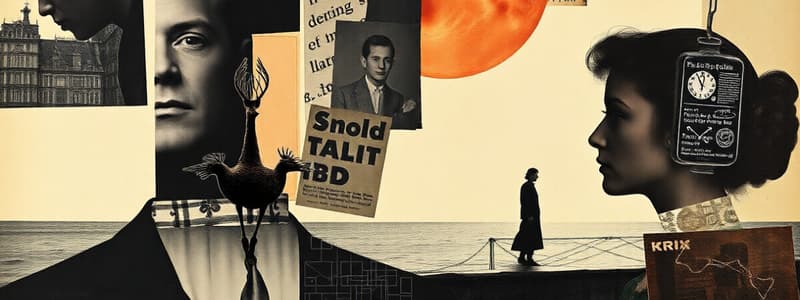Podcast
Questions and Answers
According to Freud, individuals in the Phallic stage experience a conflict known as the Oedipal complex, which refers to:
According to Freud, individuals in the Phallic stage experience a conflict known as the Oedipal complex, which refers to:
- A desire to identify with the same-sex parent and internalize their values.
- A fear of being punished for engaging in inappropriate sexual behaviors.
- A desire to possess the opposite-sex parent and a fear of the same-sex parent. (correct)
- A desire for autonomy and independence from parental control.
What is the major difference between Freud's Psychosexual Stages and Erikson's Psychosocial Stages?
What is the major difference between Freud's Psychosexual Stages and Erikson's Psychosocial Stages?
- Freud proposed a fixed number of stages, while Erikson proposed a continuous process of development.
- Freud focuses on the impact of early childhood experiences, while Erikson emphasizes the role of social interactions throughout life. (correct)
- Freud's theory is more empirically supported than Erikson's.
- Freud highlights the importance of biological drives, while Erikson emphasizes the influence of cultural factors.
Which of the following is NOT a defining characteristic of Erikson's Psychosocial Stages?
Which of the following is NOT a defining characteristic of Erikson's Psychosocial Stages?
- The stages represent distinct periods of development with specific challenges.
- Social interactions and relationships play a crucial role in shaping development.
- Each stage involves a crisis that must be resolved to move to the next.
- Fixation at a particular stage leads to personality disorders. (correct)
According to the Continuity vs. Discontinuity debate in Lifespan Development, which of these statements aligns with the Discontinuity perspective?
According to the Continuity vs. Discontinuity debate in Lifespan Development, which of these statements aligns with the Discontinuity perspective?
Which stage in Freud's Psychosexual theory is characterized by the emergence of sexual impulses and conflicts?
Which stage in Freud's Psychosexual theory is characterized by the emergence of sexual impulses and conflicts?
According to Freud's theory, what is the potential consequence of fixation during the Oral Stage?
According to Freud's theory, what is the potential consequence of fixation during the Oral Stage?
Which of the following statements best reflects the argument for 'Nurture' in the Nature vs. Nurture debate?
Which of the following statements best reflects the argument for 'Nurture' in the Nature vs. Nurture debate?
Which of these statements BEST reflects the core idea behind Erikson's Psychosocial Stages?
Which of these statements BEST reflects the core idea behind Erikson's Psychosocial Stages?
According to Erikson's stages of psychosocial development, what stage is characterized by a focus on developing intimate relationships and the potential for loneliness if this stage is not successfully navigated?
According to Erikson's stages of psychosocial development, what stage is characterized by a focus on developing intimate relationships and the potential for loneliness if this stage is not successfully navigated?
Which of Erikson's stages is primarily concerned with a child's development of a sense of competence and the potential for feelings of inferiority if this stage is not successfully navigated?
Which of Erikson's stages is primarily concerned with a child's development of a sense of competence and the potential for feelings of inferiority if this stage is not successfully navigated?
In the context of classical conditioning, what is the term used for a previously neutral stimulus that, after repeated pairings with an unconditioned stimulus, elicits a conditioned response?
In the context of classical conditioning, what is the term used for a previously neutral stimulus that, after repeated pairings with an unconditioned stimulus, elicits a conditioned response?
In operant conditioning, what is the term used for a consequence that strengthens a behavior, making it more likely to occur again?
In operant conditioning, what is the term used for a consequence that strengthens a behavior, making it more likely to occur again?
What is the key concept behind Bandura's social learning theory?
What is the key concept behind Bandura's social learning theory?
Which of the following is NOT a stage in Erikson's theory of psychosocial development?
Which of the following is NOT a stage in Erikson's theory of psychosocial development?
What is the term for the process in classical conditioning where a learned conditioned response gradually weakens or disappears after the conditioned stimulus is repeatedly presented without the unconditioned stimulus?
What is the term for the process in classical conditioning where a learned conditioned response gradually weakens or disappears after the conditioned stimulus is repeatedly presented without the unconditioned stimulus?
Which of the following is NOT a key takeaway from Freud's theory of psychosexual development?
Which of the following is NOT a key takeaway from Freud's theory of psychosexual development?
Flashcards
Nature vs. Nurture
Nature vs. Nurture
Debate on whether genetics or environment shapes behavior.
Continuity vs. Discontinuity
Continuity vs. Discontinuity
Continuity means gradual development; discontinuity means distinct stages.
Freud's Oral Stage
Freud's Oral Stage
First stage focused on pleasure from the mouth, leading to dependence.
Freud's Anal Stage
Freud's Anal Stage
Signup and view all the flashcards
Freud's Phallic Stage
Freud's Phallic Stage
Signup and view all the flashcards
Freud's Latency Stage
Freud's Latency Stage
Signup and view all the flashcards
Freud's Genital Stage
Freud's Genital Stage
Signup and view all the flashcards
Erikson's Psychosocial Stages
Erikson's Psychosocial Stages
Signup and view all the flashcards
Trust vs. Mistrust
Trust vs. Mistrust
Signup and view all the flashcards
Autonomy vs. Shame/Doubt
Autonomy vs. Shame/Doubt
Signup and view all the flashcards
Initiative vs. Guilt
Initiative vs. Guilt
Signup and view all the flashcards
Industry vs. Inferiority
Industry vs. Inferiority
Signup and view all the flashcards
Identity vs. Role Confusion
Identity vs. Role Confusion
Signup and view all the flashcards
Classical Conditioning
Classical Conditioning
Signup and view all the flashcards
Operant Conditioning
Operant Conditioning
Signup and view all the flashcards
Social Learning
Social Learning
Signup and view all the flashcards
Study Notes
Controversies in Lifespan Development
-
Nature vs. Nurture:
- Nature emphasizes the role of genetics and biology in shaping behavior (inherited traits).
- Nurture highlights the influence of environment (family, culture, education).
- Both factors play crucial roles, but experts may prioritize one depending on their area of expertise.
- Understanding both perspectives is essential for comprehending human development.
-
Continuity vs. Discontinuity:
- Continuity suggests that development is a gradual process without clear-cut stages.
- Discontinuity proposes that development occurs in distinct, separate stages.
- Both perspectives can apply to different aspects of development.
Freud's Psychosexual Stages of Development
-
Freud's theory centers on the interplay of the id, ego, and superego, impacting behavior throughout life.
- It focuses on how sexual pleasure associated with specific bodily zones affects development.
-
Oral Stage (Birth to 18 months):
- Pleasure derived from mouth activities (sucking, feeding).
- Fixation can lead to dependency in adulthood (e.g., smoking, nail-biting).
-
Anal Stage (18 months to 3 years):
- Pleasure is centered on controlling bodily functions (toilet training).
- Fixation can result in control issues (e.g., messy or overly neat personalities).
-
Phallic Stage (3 to 5 years):
- Pleasure is focused on the genitals.
- Boys experience the Oedipus complex (desires for the mother, fear of the father).
- Girls experience penis envy (desires for a penis, jealousy toward males).
- Fixation may influence gender identity and masculinity/femininity.
-
Latency Stage (5 years to puberty):
- Sexual impulses are dormant.
- Focus shifts to friendships, hobbies, and school.
-
Genital Stage (Puberty to adulthood):
- Formation of mature sexual relationships and productive work.
- Successful development leads to healthy relationships and emotional well-being.
-
Criticisms of Freud's Theory:
- Freud's theory is often criticized as overly focused on sexuality.
- It lacks strong empirical evidence.
- It doesn't adequately address adult development after adolescence.
Erikson's Psychosocial Stages of Development
-
Erikson's theory builds on Freud's work but focuses more on social and emotional conflicts rather than sexual ones.
-
It outlines eight psychosocial stages, each characterized by a specific developmental crisis that needs resolution for progress to the next stage.
-
Key features:
- Focus on social relationships.
- Stages involve positive and negative outcomes based on conflict resolution.
-
Stages overview(briefly):
- Trust vs. Mistrust (infancy)
- Autonomy vs. Shame/Doubt (toddlerhood)
- Initiative vs. Guilt (early childhood)
- Industry vs. Inferiority (middle childhood)
- Identity vs. Role Confusion (adolescence)
- Intimacy vs. Isolation (young adulthood)
- Generativity vs. Stagnation (middle adulthood)
- Integrity vs. Despair (late adulthood)
Behaviorism and Social Learning
-
Classical Conditioning (Pavlov):
- Learning through association. Stimulus association links behavior with a stimulus.
- Neutral stimulus paired with an unconditioned stimulus ultimately elicits a conditioned response.
-
Operant Conditioning (Skinner):
- Learning based on reinforcement and punishment. Reinforcement strengthens behavior, while punishment weakens it.
- Used for altering habits and behaviours
-
Social Learning (Bandura):
- Learning can occur through observation of others' behaviors (modeling).
- Learning may occur without explicit reinforcement.
- Observed learning frequently involves imitating the behavior of others
Studying That Suits You
Use AI to generate personalized quizzes and flashcards to suit your learning preferences.




